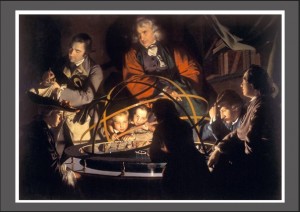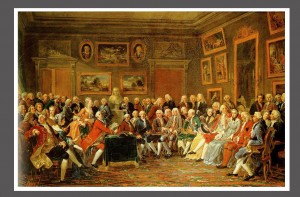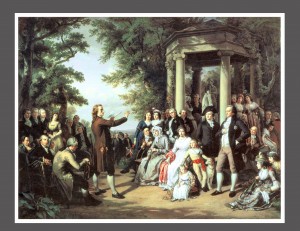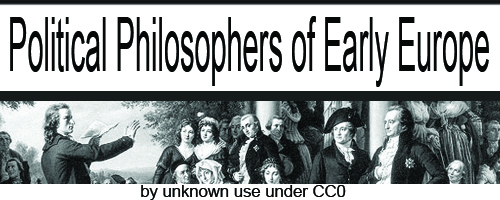Enlightenment
by Taylor Sitorius
The Enlightenment is a period of time in European history, beginning around the late 17th century and continuing throughout the entirety of the 18th [1], that worked to bring science, rational thinking, and any knowledge derived from the scientific method, to the forefront of culture and civilization [2]. It aimed “to open all aspects of life…to intellectual scrutiny and rational analysis” [4]. The term “enlightenment” stems from philosophers desire to bring the “light of reason” to civilized understandings of the world [2].

by Joseph Wright used under CC BY-SA
Enlightenment thinkers’ overarching goal was to become knowledgably in areas of intellect that were once unknown, that were once hidden in the “dark”. They desired to throw light on hidden knowledge in hopes of pushing forward the social and cultural progress of humanity [2]. Organized religion was major roadblock for Enlightenment thinkers. They blamed religion, especially Christian orthodoxy, for the popular ignorance that inhibited human progress [2]. Enlightenment thinkers proposed a separation of religion from intellectual pursuits [3]. The division of religion from scientific reason has lasted the tests of time and a secular approach to rational inquiry persists today.
Many Enlightenment philosophers and thinkers, including John Locke fought for public welfare and for the best possible good for the most possible people [2]. A focus on human rights, the natural world, continued education, technological exploration, and legal reform were all encouraged [3]. This included making knowledge accessible to all people, resulting in the reading revolution, the steady expansion of readers in middle-class European society [2], coffeehouses, local cafes where readers were able to come together and discuss ideas of the enlightenment, and Salons, the French equivalent to coffee houses [2]. Criticism of institutions both old and new, including Enlightenment itself, was encouraged [3]. According to Enlightenment philosophy, only through criticism, questioning and self-exploration could true knowledge be achieved [3].

by Anicet-Charles-Gabriel Lemonier used under CC0
Through rational exploration new ideas about politics and social philosophy were introduced to Western Europe. Political philosophers John Locke, Thomas Hobbes, and Voltaire all explored theories related to understanding human existence [5]. They explored ideas about “inalienable rights of mankind” [5]. Overall, they desired to improve the lives of individuals and society through critical, rational exploration of the world.
The divergence from religious thinking to scientific rational was a sudden change. Although it did not happen overnight, this quick 100-year change in thinking drastically altered the European cultural framework. It transformed the future trajectory of society not only in Europe but also in much of the global north. Men were now able to share their ideas with other intellectuals, academic writing was geared toward middle-class readers to ensure the equitable distribution of knowledge, [2] and attention was turned from away from tradition and focused on the future [3]. These changes were dynamic, once simple changes started larger ones followed. The progress made in the beginning of the Enlightenment developed into more cultural changes and the period continued resulting in the modern western society we experience today.

by Unknown used under CC0
The drastic and dynamic natures of the Enlightenment made it a revolutionary moment in history. But along with these changes, most revolutions also introduce questions of ethical and moral standards, usually resulting in the creation of new social asymmetries and imbalances. Before the Enlightenment, intellectuals identified problems with religious bigotry, but after, some argued that one darkness was simply replaced with another [2]. Science and reason was used to justify sexism, racism, and other prejudice [2]. But later, it was this same scientific inquiry that “allowed societies to recognize…humans are by nature different, and…they can by made to seem the same only through coercion” [2]. The Enlightenment introduced a desire to know more than what the bible could share [4]. New wonderful discoveries through science and questioning of self and surrounding followed the desire for deeper knowledge and understanding but no system of thinking is ever perfect. Revolution brings both positive and negative changes, and the Enlightenment is no exception.
[1] Bristwo,William (2001). Enlightenment. In Stanford Encyclopedia of Philosophy.
[2] The Enlightenment. (2005). In E. I. Bleiberg, J. A. Evans, K. M. Figg, P. M. Soergel, & J. B. Friedman (Eds.), Arts and Humanities Through the Eras (Vol. 5, pp. 304-306). Detroit: Gale.
[3] Porter, R. (2001). MATRIX OF MODERNITY. History Today, 51(4), 24.
[4] Christianity, Science, and the Enlightenment. (2005). In E. I. Bleiberg, J. A. Evans, K. M. Figg, P. M. Soergel, & J. B. Friedman (Eds.), Arts and Humanities Through the Eras (Vol. 5, pp. 377-382). Detroit: Gale.
[5] Overview for the Age of Revolutions. (2013). In J. Stock (Ed.), Global Events (Vol. 4). Farmington Hills, MI: Gale.
